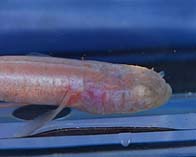| Family: |
Amblyopsidae (Cavefishes) |
| Max. size: |
9 cm TL (male/unsexed); max. reported age: 4 years |
| Environment: |
demersal; freshwater |
| Distribution: |
North America: portions of Alabama, Georgia, Tennessee, Kentucky, Indiana, Missouri and Arkansas, U.S.A. |
| Diagnosis: |
Dorsal soft rays (total): 7-10; Anal soft rays: 7-10; Vertebrae: 28-29. Pink-white. No eyes (vestigial eye tissues under skin). Large, broad head. Caudal fin with 0-2 rows of papillae (Ref. 5723) and a vertical basal row (Ref. 10294); 10-15 branched caudal rays (Ref. 5723). |
| Biology: |
Adults inhabit subterranean water (Ref. 5723). Found in caves which are near the water table and are therefore more uniform than other amblyopsid caves (Ref. 34868). Feed mainly on copepods, amphipods and isopods (Ref. 10294). Eggs are carried in gill chambers of females (Ref. 205). |
| IUCN Red List Status: |
Near Threatened (NT); Date assessed: 07 August 2012 Ref. (130435)
|
| Threat to humans: |
harmless |
Source and more info: www.fishbase.org. For personal, classroom, and other internal use only. Not for publication.

